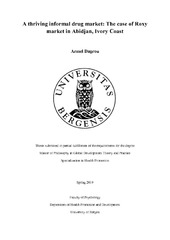| dc.description.abstract | In the last decade, the informal drug market (IDM) in sub-Saharan Africa has been growing exponentially, including in Ivory Coast. This growth of the informal market could be partly attributed to the failure by states in their duties of provision and regulation of medical drugs. In Ivory Coast, the informal market is an unofficial core part of the health system and provides for up to 70% of the national medicines supply. Given the risk associated and attributed to this informal drug market, it is important to understand factors leading to the growth of this market and the role of the government in regulating this market. A case study qualitative design was chosen for this study. The main methods for data collection were semi-structured interviews and focus group discussions (FDGs). In addition, the study also relied on policy documents and informal observations. The study had three categories of study participants, purposively selected, to unravel this complex phenomenon: sellers of the drugs, buyers of the drugs and health experts with extensive pharmaceutical knowledge. Four semi-structured interviews were conducted, two drug sellers and two health experts. Two FGDs of four participants each were also conducted with buyers of the drugs. Roxy market a well-known informal drug market in Adjamé, a district in Abidjan, was purposively selected as the study site. The study found out that the main reason for using the IDM are the following: it is cheaper, the pricing is flexible, the drugs are of good quality albeit this being heavily contested by health experts and that it is less regulated and therefore more flexible. The informal drug market was also favored for cultural, social and religious reasons and finally the market thrives because it is a source of employment and sustains many families. The study found out that there was a perceived failure by the government to execute its duties of provision and regulation in the drug market. The study findings were consistent with the AAAQ framework used in this study. The study concludes that there many factors pull people to the informal drug market and these factors cannot be separated from the failure of the state in its roles making sure its citizens has access to drugs and that of regulation this market. In this regard the state needs to re-establish its role and potentially work towards formalizing this informal market taking more of a collaborative than confrontational approach as this market is thriving and growing. | en_US |
